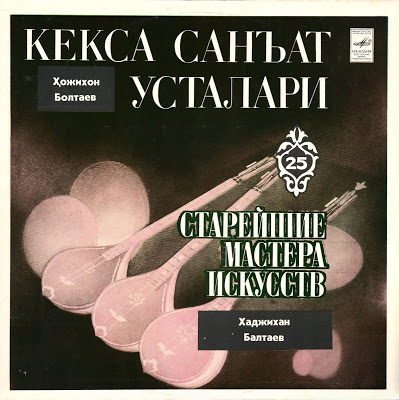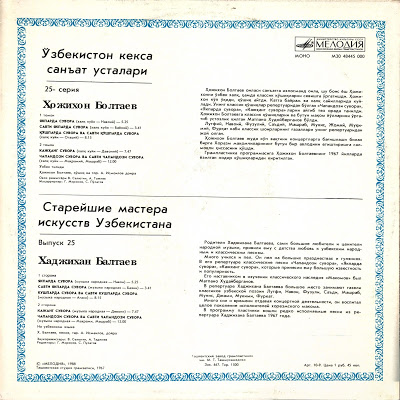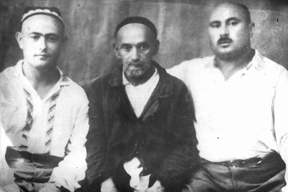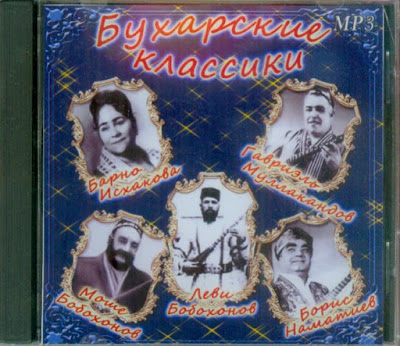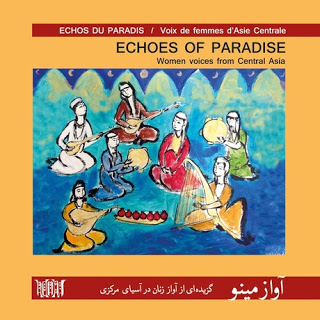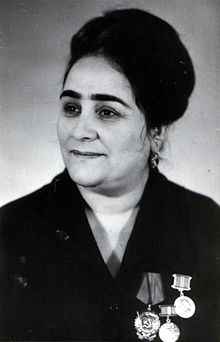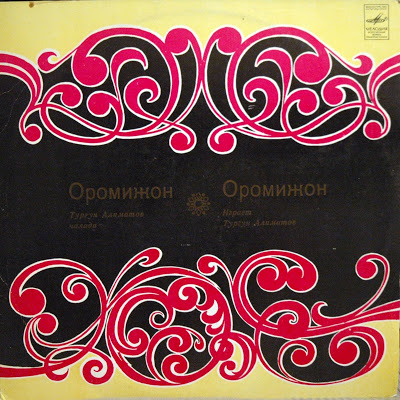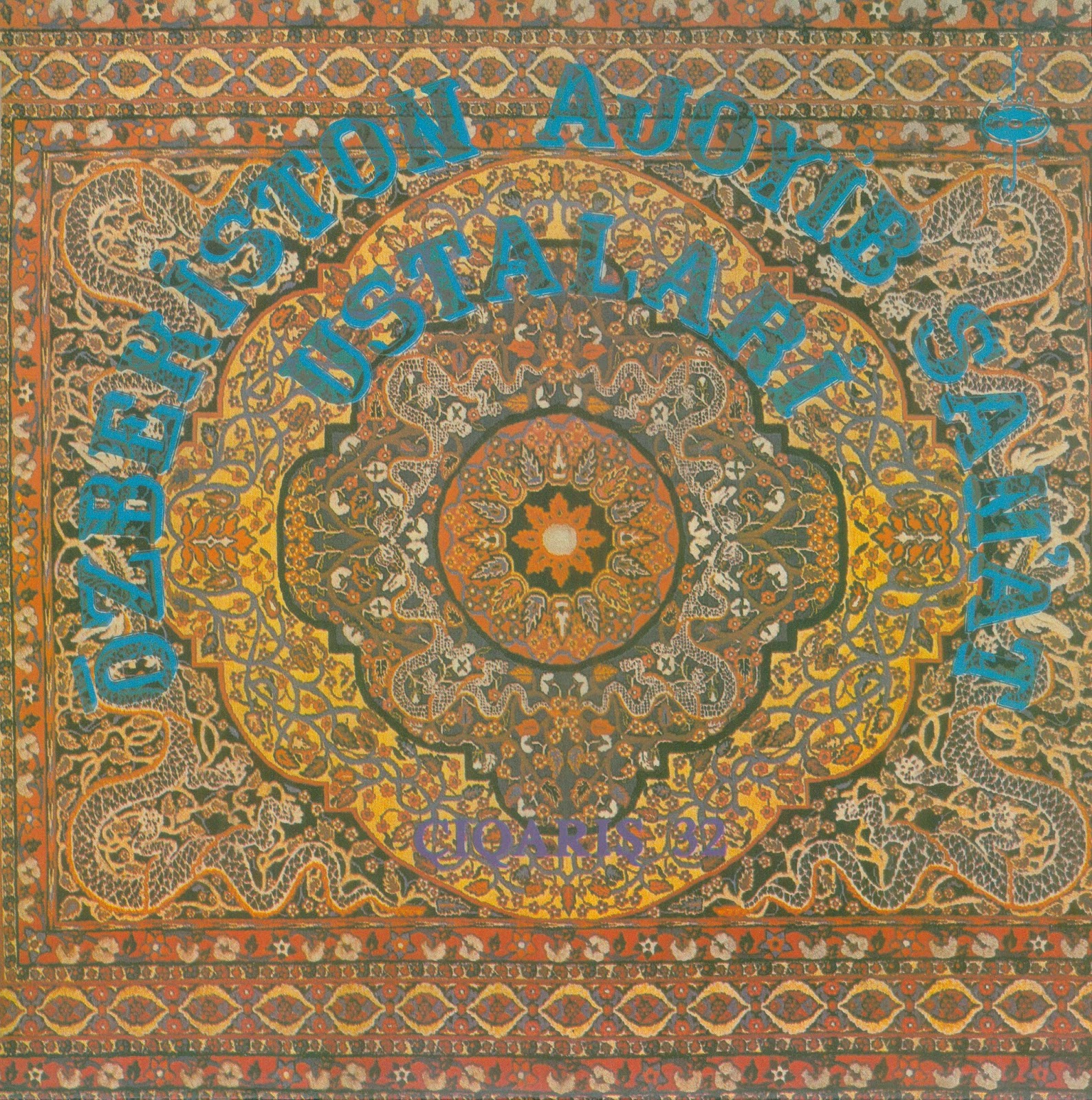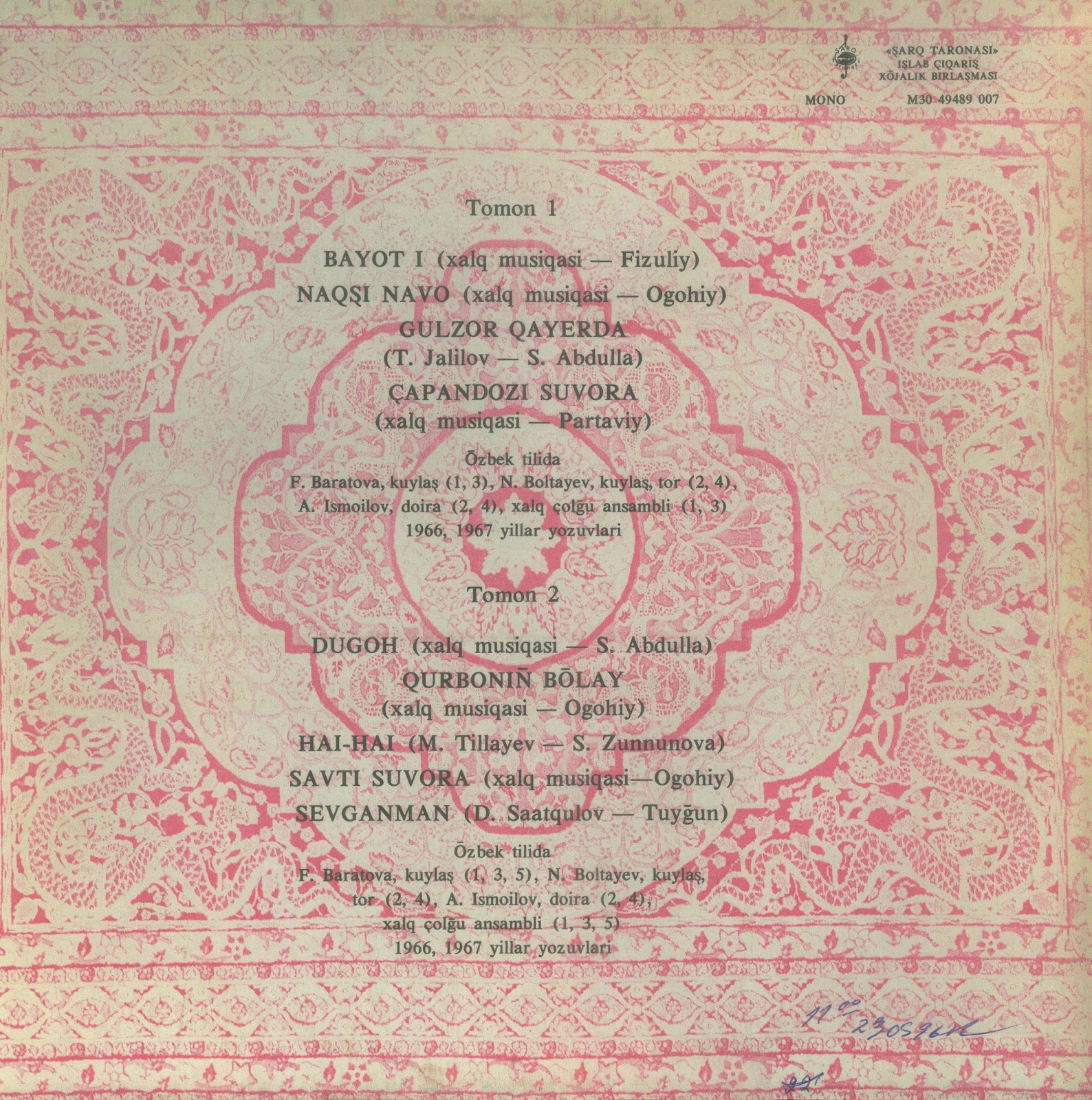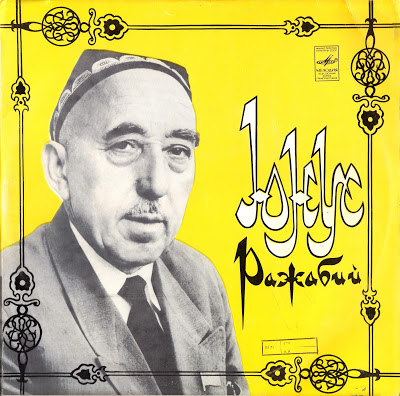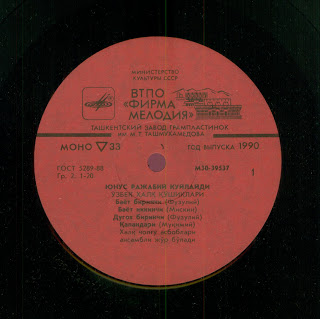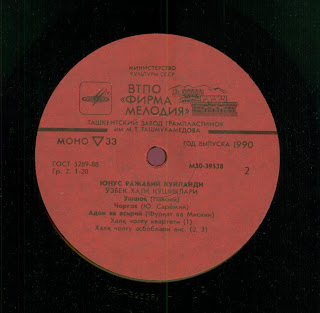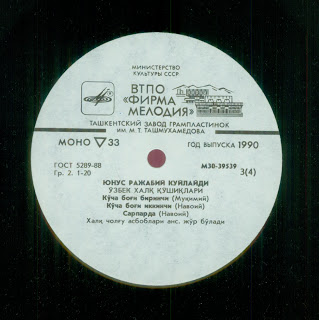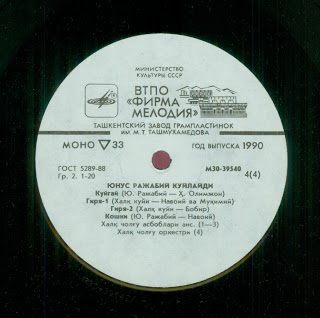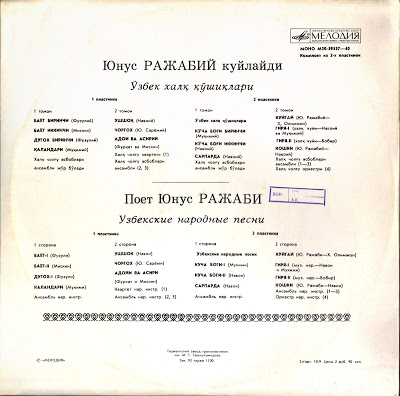Next in our series of Uzbek MP3-CDs, which our friend Danny brought years ago from Uzbekistan, we present one by Berta Davidova, the great singer of the Shashmaqam of Bukhara. She was one of the main singers in the legendary complete Shashmaqam recorded in the early 1960s under the direction of Yunus Rajabi, which we posted in 2012. See:
Berta (Balur) Davydova (1922-2007) was a famous singer from Uzbekistan. She was
born into a family of Bukharian Jews and learned to speak many languages such as
her native tongue of Bukhori (Bukharian Jewish language), Uzbek, Russian, and
Tajik. She sang songs in many of these languages and other languages of the
people of the world. She was honored as People's Artist of the Uzbek SSR
(Uzbekistan) for her work. A famous Uzbek song with words by Uzbek poet
Alisher Navoiy, called "MUNOJOT" (Prayer), made Berta Davydova very famous and
beloved by many people in Central Asia, the former USSR, and abroad. She sang
the song so well that she received the title by some as "MISS MUNOJOT". She will
always be remembered for her music and development of the culture of the Central
Asian peoples like Uzbeks, Tajiks and Bukharian Jews. She is buried at the
Bukharian Jewish Cemetery in Tashkent Uzbekistan.
Remembering Berta Davidova. (To the 90th Anniversary)
EDITOR NEW • 16/03/2015 • ISSUE #4 • 294
In December 2012, Berta Davidova, the People’s Artist of Uzbekistan, a
remarkable singer who made a solid contribution to the national art, would have
turned 90. Her life and work are covered in academic papers, numerous television
shows, and a film-concert called “Berta Dovidova kuylaydi” [Sings Berta
Davidova]; there is a record and a CD of the masterpieces of traditional Uzbek
music professionally performed by her. The present author is hopeful that these
recollections of her late mother-in-law, as impartial evidence, would inform our
knowledge about Davidova’s outstanding personality and be of interest to the
reader who is familiar with the art of the singer.
Berta Davidova (her real name was Billur, which means “crystal”, but only
her close relatives called by this name) represents the oral tradition of ustoz
– shogird [teacher to student] system of professional training. She never
studied at a conservatory and did not know notation, but the school of vocal
performance she went through as a singer could be envied by many a performer
with a formal education certificate. Among Davidova’s first teachers
were bastakor Imomjon Ikramov, the author of the “Munojot” song that made her
famous: he personally rehearsed it with her; and the renowned masters
of maqom Fazliddin Shahobov, Shonazar Sahibov, and domla Zirkiev. But all her
life she considered Yunus Rajabi her most influential Teacher. He was the one
who introduced her to the secrets of maqom singing, and, for the first time in
the history of maqom, which was never performed by women before,
entrusted shube (the solo numbers) to Berta Davidova in a recording of a Bukhara
Shashmaqom by an all-star cast of the maqom performers’ ensemble.
Berta-opa often mentioned that Rajabi was giving a lot of attention to
vocal technique, not permitting her to force the audj (culminations) with an
open, throaty sound; to the skill of using diaphragm – the so-called nasal
singing; and to the correct distribution of breath during long hanga chants.
(Not an expert in vocals, I regret not having recorded these methods then).
Persistently working to achieve the desired result, the teacher sang phrase
after phrase together with her, accompanying them on either a tambur, or
a dutar, beating the most complex usul (rhythmic formulas) on doira [tambourine],
and Berta, with her impeccable sense of rhythm, reproduced them accurately on
the same doira. Rajabi also paid much attention to lyrics, explaining their
content and complex, polysemantic imagery.
Telling about her training sessions with Rajabi, Berta-opa always noted
that the learning of maqom had not started immediately. For quite a while, the
teacher was introducing her to folklore material and the songs
of bastakor performers, where she could use the skills acquired when she was a
soloist in the Radio Committee folk instruments ensemble conducted by Dani
Zakirov. Based on her own experience, the singer claimed that maqom performance
requires not only a mature voice, but also certain life experience. She believed
that an artist, who never suffered emotional pain, would not be able to feel the
spirit of maqom, comprehend its essence and meaning, and communicate it to the
listener.
The validity of the statement is proved by an interval of almost thirty
years between the recordings of “Munojot”. The first version (1949), filled with
exultation of the young voice that effortlessly deals with vocal complexities,
is different from the widely known later recording (1975) that communicates the
focus of the experience master on presenting the dramatic character in the most
refined finish. Artistic principles borrowed from her teacher and complemented
with her own practice Davidova tried to apply to her work with conservatory
students learning traditional singing; she did not always agree with the syllabi
and often criticize them in terms of their practical relevance.
Valuing her profession highly, she bore the title of the People’s Artist
with dignity and pride. In my memory, she never accepted offers to perform at
wedding parties, although, given the singer’s enormous popularity, there was no
shortage of them. She refused to benefit from this way of earning money, so
common in the artistic environment, not because she was too rich – her rate for
a solo concert at that time was little more than 19 roubles; neither did she own
a luxury apartment or a country house. It is just that the atmosphere of the
nuptial feast did not match her perception of maqom art and the special mission
of its bearers. However, as a guest, she agreed when asked to sing something,
and could even dance, leaving all the cash that was coming her way to the party
musicians.
Berta-opa prepared for her appearances on television very carefully and
responsibly (in the 1980s, when she no longer gave concerts). She herself put
her concert costume in order: attire in Fergana style, with a light coat of
striped bekasam [textile blend of cotton and silk], white satin or
crepe-de-Chine dress, losim pants, a silk scarf worn smartly across,
lacquered kaush shoes, and traditional jewellery. She rehearsed, accompanying
herself on doira, first softly, and then, as her vocal chords warmed up, in a
full voice; she never sang before the concert, relaxing and concentrating on the
upcoming performance. All this reminded me of the charity concert preparation by
the heroine of Ivan Bunin’s remarkable story “Favourable Part”.
Having phenomenal musical memory that could store long and complex shube,
Berta-opa sometimes had difficulty remembering lyrics – ghazal in old Uzbek and
Persian/Tajik languages. This brings to mind one humorous episode. Television
producers were preparing a program dedicated to the poetry of Babur, if my
memory is correct, and Berta-opa had to perform a piece based on his verses. By
that time, she no longer worked, that is, was not in shape for a concert all the
time. The proposal came unexpectedly, and there was not enough time for
preparation. The solution was as follows: I found a piece of wallpaper left
after renovation (in those days paper of the desired format was not readily
available), Berta-opa wrote the text in large letters on the reverse side, and
the rehearsal began. I acted as a prompter, holding the text before her eyes. In
the text, a strange word ‘povza’ appeared with certain intervals, and when I
asked Berta-opa about it, she said, “Here musicians play, and am silent”. The
‘povza’ meant ‘pause’ in the vocal part! During recording, the text with ‘povza’
was held behind the camera, and the performance ran without a hitch. This was
not the only funny incident in her career. With her characteristic sense of
humour, Berta-opa recalled one outdoor concert, when, performing rather complex
and lengthy audj, she suddenly felt some kind of midge flying into her mouth! “I
had to swallow it! Luckily, I didn’t choke on it, and the audience saw
nothing”.
The singer often told stories about concerts delivered during cotton
harvesting, when performers went out “into the fields of the land”, as people
used to call it. They usually travelled by trucks with open body (buses appeared
later); with sides down, the trucks turned into a stage, and the driver’s cabin
served as a dressing room. The audience coming to shiypan (an open terrace in
the field camp) straight from the field accommodated themselves on the ground,
sitting on aprons used to pick up cotton, while younger people climbed the
nearby trees. There was no amplification equipment or microphones (at that time
people had no idea about a lip synch!) – just live music and sound in the open
air. The response of the audience, too, was live, not recorded, not programmed.
“How did they clap their hands, calling us again and again, thanking us and
inviting to visit them again! I always tried to sing at the top of my voice, to
entertain and cheer them up”.
Her voice had a kind of magical power and indescribable timbre, sounding
smoothly and naturally in all registers. It seems, however, that the secret of
Berta Davidova’s singing talent was not so much in the excellence of her
performing technique, but rather in her ability to sing with her heart,
empathize with her characters, and create a dramatic solo show, convincing and
winning the listener with the interpretation she discovered. Her gestures, the
expression of her face and eyes, and the vocal techniques she employed were
justified by the content of a piece, helping the singer “to burn human hearts
with a word”. The audience responded adequately: I remember a foreign graduate
student visiting with her son on holidays, who was not a musician and did not
understand a word in Uzbek: he wept as he listened to “Fighon” (“Lament”)
performed by her. In the days of television broadcasts featuring Berta Davidova
the phone kept ringing with calls from fans, friends, and acquaintances. Those
were the happy moments for her.
Davidova valued the recognition of her audience – people who approached her
in the streets with expressions of gratitude and admiration. Sometimes this
popularity had a comic side to it: the moment she arrived in the Alai farmer’s
market and went to the stalls, prices went up at once, for the sellers knew that
Berta-opa never bargained, upholding her image. Still, even among the merchants
there were unselfish amateurs of her art. I remember an elderly woman selling
bread who always brought her finest patyr to her favourite singer, never
accepting money, despite the attempts to pay.
For Berta-opa another proof of people’s love was the much cherished
yellowed letter from the people of Andijan that arrived to the Radio Committee
in 1957 and was passed on to the singer by its chairman H. Ibragimov. The letter
contained a request to broadcast the songs of their favourite singer more often,
and a suggestion to reward her artistic achievements. In the same year the title
of the Honoured Artist of Uzbekistan was conferred on her, and Berta-opa always
believed that she largely owed it to her admirers.
Deep and sincere was the singer’s love for her home country. When awarded
the El-Yurt Hizmati [Service to the Nation] Order by the President Islam
Karimov, in all her interviews and public appearances she always spoke of her
devotion to the country that nurtured her and to its people, whose art she
served. This was her conscious position chosen once and for all, and she
repeatedly rejected offers to leave the country. Once the top party leadership
of Tajikistan approached Sharaf Rashidov with an official request, to which a
negative response was given, first of all, by her. Once Uzbekistan became
independent, Israeli officials repeatedly offered Davidova to return to her
‘historical homeland’; she also received invitations from her brothers – one in
Canada, the other in Germany, and still the other in Israel. Yet she invariably
answered: “Here I was born and happened to be of some use, and here I will die.
Uzbekistan made me its people’s artist – so it will bury me the way it should
be”. She, certainly, regretted that in the bloom of her art she could not go on
tour abroad, as today’s singers and musicians do, but she never imagined her
life outside her native environment.
The singer was as adamant in her choice between art and family. She had to
part with the father of her only son due to the firm demand to abandon her
profession and leave stage. Another attempt to fix her personal life also ended
in a failed relationship: Berta’s second husband, one of the managers in
GlavMosStroy [the Moscow Construction Administration] who arrived in Tashkent in
the aftermath of the 1966 earthquake, invited her to move to Moscow where he had
a nice apartment and comfortable life. Berta-opa recalled: “When Sharaf
Rashidovich Rashidov learned about this, he invited us to his office and
listened to our story. He had no objection to my move to my husband’s, yet he
noted: ‘Your art is needed here. Your audience, the fans and admirers of your
talent are all here. Think about what is more important to you, so that you
don’t regret it in the future.’ I gave it a thought – and stayed…”
Berta Davidova is no longer with us, but the singer’s voice lives on in
records, delighting the ear and aesthetic sense of amateurs of traditional
music. Her vocal art has not yet been studied thoroughly, awaiting its
researcher who, as we hope, will soon arrive. The Art of Berta Davidova, the
People’s Artist of Uzbekistan, left behind as heritage of our nation is worthy
of examination and careful research.
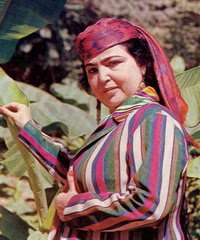
BERTA DAVIDOVA
In recent years we have witnessed an active interest towards classical
Oriental music art in the whole world. Makom is a phenomenon of the spiritual
culture of Central Asia; however its significance goes for beyond the limits of
the region. From the philosophical point of view, makoms are a musical
reflection of the objective reality, expressed through symbols and notions of a
high aesthetic order through pursuit of harmony of Infinity. Although we marvel
at beauty and manysidedness of the instrumental part, it is still the vocal that
forms the bases of makoms.
Life and creative activity of the wonderful singer of makoms - Berta
Davidova is closely intertwined with the history of development of traditional
musical arts of Uzbekistan. Despite the fact that her professional biography has
always been closely linked to the history of the formation makomists' first
ensemble, it is from/with her name that the popularity of female solo makom
performance begins. Female vocal parts were an innovation seen as deviation from
traditions in the practice of performance of makoms.
Berta Davidova was born in 1922 in Margilan in a family which loved music
and supported musical talents of the girl. In 1935-1938 she studied at Tashkent
Medical Vocational School. During the Second World War she worked as a nurse at
Tashkent military hospital, where she sang for wounded soldiers, patients of the
hospital.
Berta Davidova's career as a singer began in 1943, when she started to work
as a soloist of the chorus of the State Radio Committee, and then as a soloist
of "Makom" ensemble under the leadership of Yunus Rajabiy. She became renowned
as early as in 1946 after she had performed classical folk song "Munojat" during
the live broadcast on Uzbek radio.
In 60s of XX century, over period of work in "Makom" ensemble, where her
talent and remarkable musical gifts showed up best, she quickly became
well-known and occupied a well-deserved place among outstanding artists of the
country and beyond. Spiritually elevated poetics of the invaluable asset of the
national and world culture "Shashmakom", which has formerly been considered as
elitist, palatial music, became accessible to general public and acquired
popularity to a large extent due to high performing mastery of Berta Davidova
and her self-sacrificing serving the cause of art. Makoms formed the basis of
her repertoire. In makom's history there were many bright performers, but the
performance manner of Berta Davidova rendered makoms with new inimitable
sounding amidst established traditions. Makom pieces when performed by her were
steeped in deep sensations, disclosing not only the deep philosophic meaning of
Oriental poetry, but also richness of her own soul.
Possessing her phenomenal musical abilities and faculty of coordinating
breath and voice, which was remarkable due to unique strength and beautiful
tone, enabled her to perform unrivaled ŕudjes - plangent wide-range culminations
of vocal parts.
Apart from makoms, Berta Davidova performed classic songs, such as
"Munojat", "Figon", "Sarakhbori Oromijon", "Samarkand ushogi", "Dugokh",
"Bayot-1", etc.
Both makoms and song repertoire of the singer is included in the "Golden
Stock" of Uzbek radio. Due to outstanding talent of Berta Davidova, a large
variety of pieces of Oriental musical art has been included in the world
treasury of musical masterpieces."
See also this passage from the book "From Shamanism to Sufism: Women, Islam and Culture in Central Asia" by
Razia Sultanova. The two female singers on the records of the complete Shashmaqam talk there (in chapter
22) about their lives, and about the recording of this Shashmaqam:
and:
